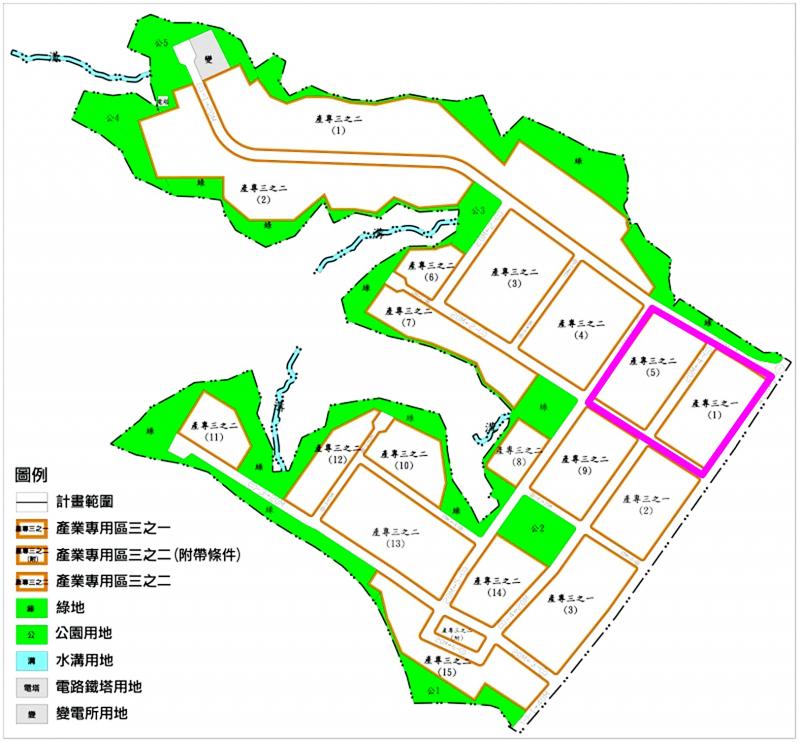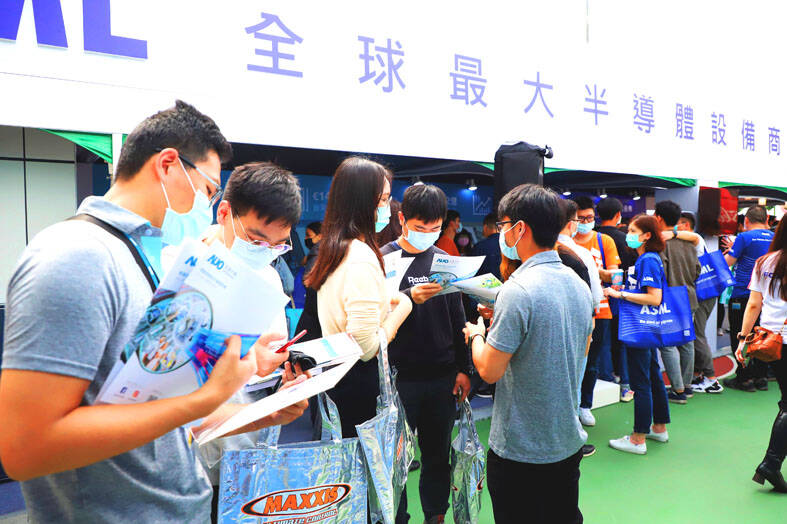Dutch chipmaking equipment supplier ASML Holding NV is planning to offer NT$1.6 million (US$51,331) or more in starting annual pay to engineers with a master’s degree at its sites in Taiwan.
The major supplier to contract chipmaker Taiwan Semiconductor Manufacturing Co (TSMC, 台積電) said it is keen to offer competitive compensation comprised of salaries, bonuses and other financial incentives as it seeks to expand its talent pool in Taiwan.
The company, which is planning to build a plant in New Taipei City, said engineers would in their first year be granted 10 days annual leave, compared with the minimum of three days per six months stipulated in the Labor Standards Act (勞動基準法).

Photo courtesy of the New Taipei City Economic Development Department
Starting from next year, ASML’s female employees would also get 14 weeks of maternity leave and male employees 10 days of paternity leave, compared with a legal minimum of eight weeks and seven days respectively.
Amanda Ho (何思穎), chief financial officer of ASML’s Taiwanese and Southeast Asian operations, said that 35 percent of the firm’s local employees have no engineering, science, technology or mathematics-related degrees.
ASML is committed to helping those workers build their careers, she said.

Photo courtesy of National Taiwan University of Science and Technology
In-house training programs would run six to 18 months, the company said, adding that it spends more than NT$5 million on training each new engineer.
The recruitment campaign is in line with the company’s new investment project announced earlier last week to build a new production complex in New Taipei City’s Linkou District (林口) to better serve its clients in Taiwan.
The New Taipei City Government said that the first phase of ASML’s investment is expected to total NT$30 billion, the company’s largest investment plan in Taiwan to date, with a campaign to hire 2,000 workers for the Linkou campus, which is to include production lines, offices, a research and development center, and logistics and warehousing operations.
ASML is the world’s sole supplier of extreme ultraviolet lithography (EUV) machines used by semiconductor manufacturers to produce cutting-edge chips.
In addition to TSMC, the company’s other prominent clients include Taoyuan-headquartered DRAM maker Nanya Technology Corp (南亞科技) and US-based Micron Technology Inc, which are planning to install EUV photolithography machines.
The Veldhoven, Netherlands-headquartered company has 60 operation hubs in 16 countries, with Taiwan as its largest hub in Asia.
In Taiwan, ASML has four client support centers, two research-and-development centers and two training centers, with its workforce expected to expand to 4,500 by the end of this year.

Vincent Wei led fellow Singaporean farmers around an empty Malaysian plot, laying out plans for a greenhouse and rows of leafy vegetables. What he pitched was not just space for crops, but a lifeline for growers struggling to make ends meet in a city-state with high prices and little vacant land. The future agriculture hub is part of a joint special economic zone launched last year by the two neighbors, expected to cost US$123 million and produce 10,000 tonnes of fresh produce annually. It is attracting Singaporean farmers with promises of cheaper land, labor and energy just over the border.

US actor Matthew McConaughey has filed recordings of his image and voice with US patent authorities to protect them from unauthorized usage by artificial intelligence (AI) platforms, a representative said earlier this week. Several video clips and audio recordings were registered by the commercial arm of the Just Keep Livin’ Foundation, a non-profit created by the Oscar-winning actor and his wife, Camila, according to the US Patent and Trademark Office database. Many artists are increasingly concerned about the uncontrolled use of their image via generative AI since the rollout of ChatGPT and other AI-powered tools. Several US states have adopted

A proposed billionaires’ tax in California has ignited a political uproar in Silicon Valley, with tech titans threatening to leave the state while California Governor Gavin Newsom of the Democratic Party maneuvers to defeat a levy that he fears would lead to an exodus of wealth. A technology mecca, California has more billionaires than any other US state — a few hundred, by some estimates. About half its personal income tax revenue, a financial backbone in the nearly US$350 billion budget, comes from the top 1 percent of earners. A large healthcare union is attempting to place a proposal before

KEEPING UP: The acquisition of a cleanroom in Taiwan would enable Micron to increase production in a market where demand continues to outpace supply, a Micron official said Micron Technology Inc has signed a letter of intent to buy a fabrication site in Taiwan from Powerchip Semiconductor Manufacturing Corp (力積電) for US$1.8 billion to expand its production of memory chips. Micron would take control of the P5 site in Miaoli County’s Tongluo Township (銅鑼) and plans to ramp up DRAM production in phases after the transaction closes in the second quarter, the company said in a statement on Saturday. The acquisition includes an existing 12 inch fab cleanroom of 27,871m2 and would further position Micron to address growing global demand for memory solutions, the company said. Micron expects the transaction to